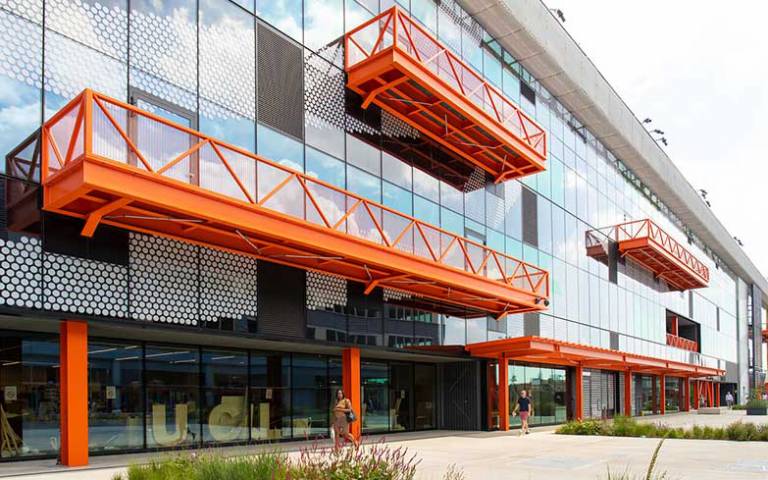New accessible technology hub launched to drive disability-led innovation
20 September 2019
The UK’s most accessible technology hub to drive disability innovation and assistive technology has been launched today by UCL, Plexal and Here East.

The East London Inclusive Enterprise Zone (ELIEZ) is the first fully accessible, specially designed space for entrepreneurs and businesses leaders who are disabled, or are focused on servicing disabled people.
It will feature an innovation lab optimised for accessibility, which will accelerate the development of needed products and services through from idea stage to global deployment. The zone will also coordinate the delivery of accessible innovation education, training and events.
About 15% of the global population has a form of disability, yet disabled people are frequently excluded from the opportunities available to non-disabled people.
As an example of this exclusion, only one in ten disabled people has access to the assistive technology they require to go to school, work, or have a family. In the UK, the disability employment gap – the difference in the rate of employment of disabled people and non-disabled people – has remained at around 30% for a decade.
The new hub aims to support entrepreneurship and transform the business of accessible innovation from a cottage industry into a fledgling sector, which drives better inclusion and productivity.
The zone will build on the success of the Global Disability Innovation (GDI) Hub based at UCL, which already provides exceptional disability-focused teaching, research and innovation as well as delivering a UK Aid funded £20m global programme on assistive technology.
Recently, the GDI Hub team partnered with a company called Amparo to evaluate the use of its lower limb prosthetics in Kenya. Together, they aim to reduce the cost and difficulties of lower limb prosthetic manufacturing and ensure people in low and middle-income countries can access the prosthetic services that they need.
Dr Catherine Holloway, the Academic Director of the GDI Hub at UCL, said: “The East London Inclusive Enterprise Zone builds on the legacy of the London 2012 Paralympic Games – the most successful Paralympic Games ever. More importantly, it will nurture a new generation of diverse entrepreneurs and innovators who are committed to developing a better, fairer future for all people.
“Our aim is to launch 100 new startups which will then kick-start the UK’s first inclusive innovation sector and foster inclusive technological, social and economic growth for the benefit of all.”
In addition, UCL Innovation & Enterprise will use its business expertise to support the ambitions of the ELIEZ and deliver on the potential of inclusive innovation. The team has a successfully supported the launch of 68 graduate startups at UCL’s BaseKX incubator in the past 12 months, attracting £7.5 million of external investment.
Dr Celia Caulcott, UCL’s Vice-Provost (Enterprise), said: “We believe that universities like UCL must work together with industry, third sector and government to solve complex social, environmental and technological challenges. The East London Inclusive Enterprise Zone exemplifies the sort of sustainable, inclusive growth we might aim for in the future.
“Improving the lives of all people with disabilities is something we as a society should absolutely be striving to achieve under any circumstances. At the same time, this project has the added benefit of effectively creating new market sectors – stimulating local economies and also increasing overall productivity.”
The ELIEZ delivers on the area’s Paralympic Legacy and will bring a positive impact on the local east London community, creating thriving new businesses, employment and growth.
Science Minister Chris Skidmore said: “Small businesses are the lifeblood of our economy, and London has a thriving ecosystem of local businesses and entrepreneurs whose creativity and determination help underpin the UK’s position as a leading innovator.
“Alongside this, many of London’s research community are right on the precipice of turning ground-breaking ideas into real products and services which could change the lives not just of people in the local community, but people around the world.
“Today’s funding will not only help local scientists take their ideas from lab to market – but will also support an enterprise hub at UCL. Providing space for local businesses to forge crucial partnerships, the UEZs will create jobs, drive local growth and provide SMEs with a vital steppingstone to succeed.”
The Zone is a collaboration between, UCL, Plexal, Here East, Global Disability Innovation Hub, Disability Rights UK, Capital Enterprise, Greater London Authority, Loughborough University, London College of Fashion, UAL, Hackney Council, Ford Mobility, Inclusion London, Barclays Eagle Labs and the London Legacy Development Corporation (LLDC).
Deputy Mayor of London for Business, Rajesh Agrawal, said: “The Mayor and I are committed to ensuring all Londoners can participate in our thriving economy. This exciting new project is an important step in making this a reality and creating new opportunities for disabled entrepreneurs. I’m thrilled that such a diverse group of partners has come together to create this new innovation zone and I look forward to seeing it help new startups grow and thrive.”
It is one of 20 University Enterprise Zones (UEZs), launched with a £20 million investment and delivered by Research England, part of UK Research and Innovation.
The £1.2 million project will receive £500,000 from Research England, match-funded and supported through in-kind contributions by the partners. This investment is a decisive step in a journey that will welcome further partnerships into an inclusive innovation ecosystem.
Links
- Dr Catherine Holloway's academic profile
- GDI Hub at UCL
- UCL Engineering
- UCL Innovation & Enterprise
- To register interest in the East London Inclusive Enterprise Zone (ELIEZ), visit: bit.ly/ELIEZ-register
- Coverage
Image
- UCL at Here East
Media contact
Bex Caygill
Tel: +44 (0)20 3108 3846
Email: r.caygill [at] ucl.ac.uk
 Close
Close

